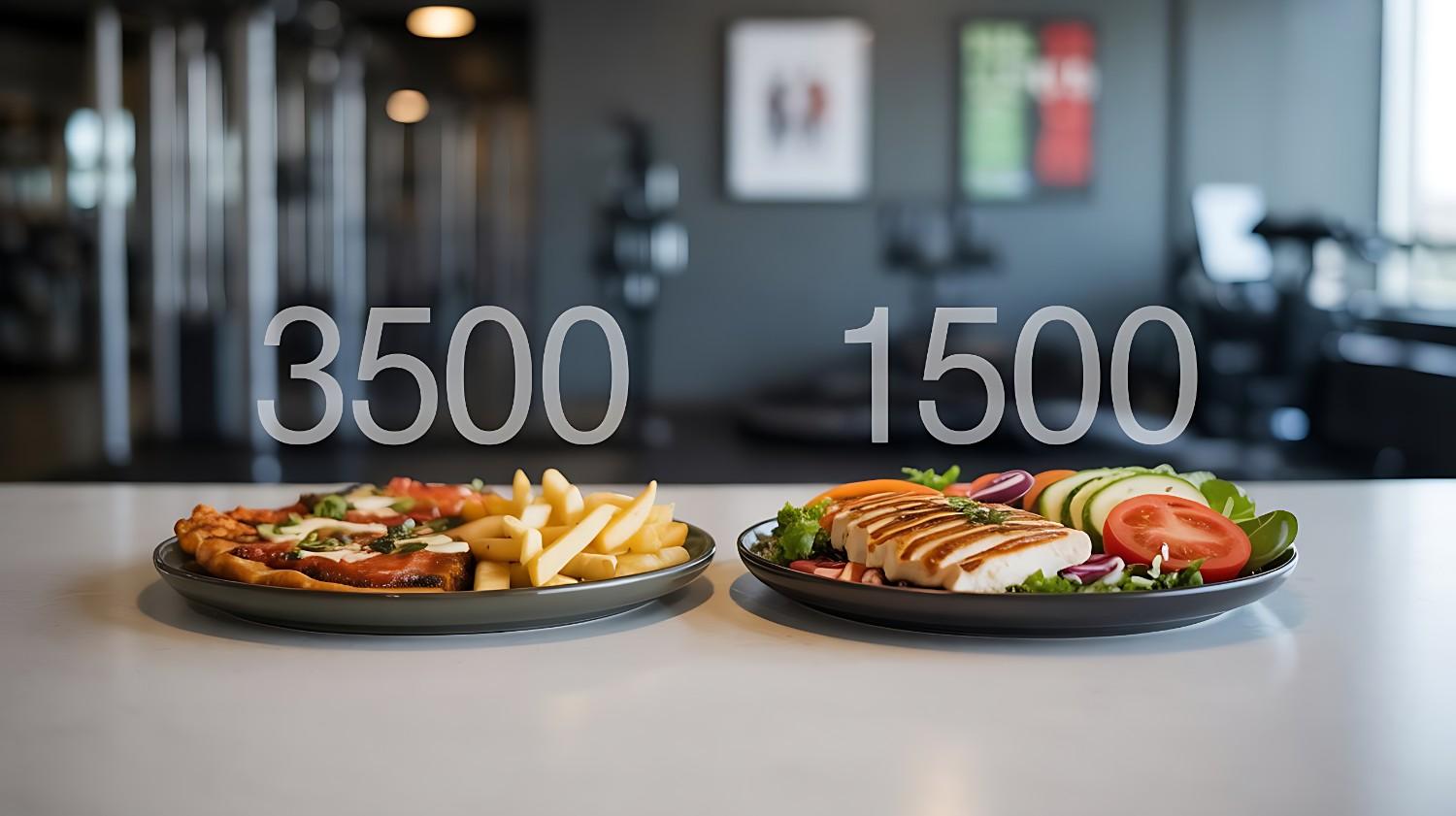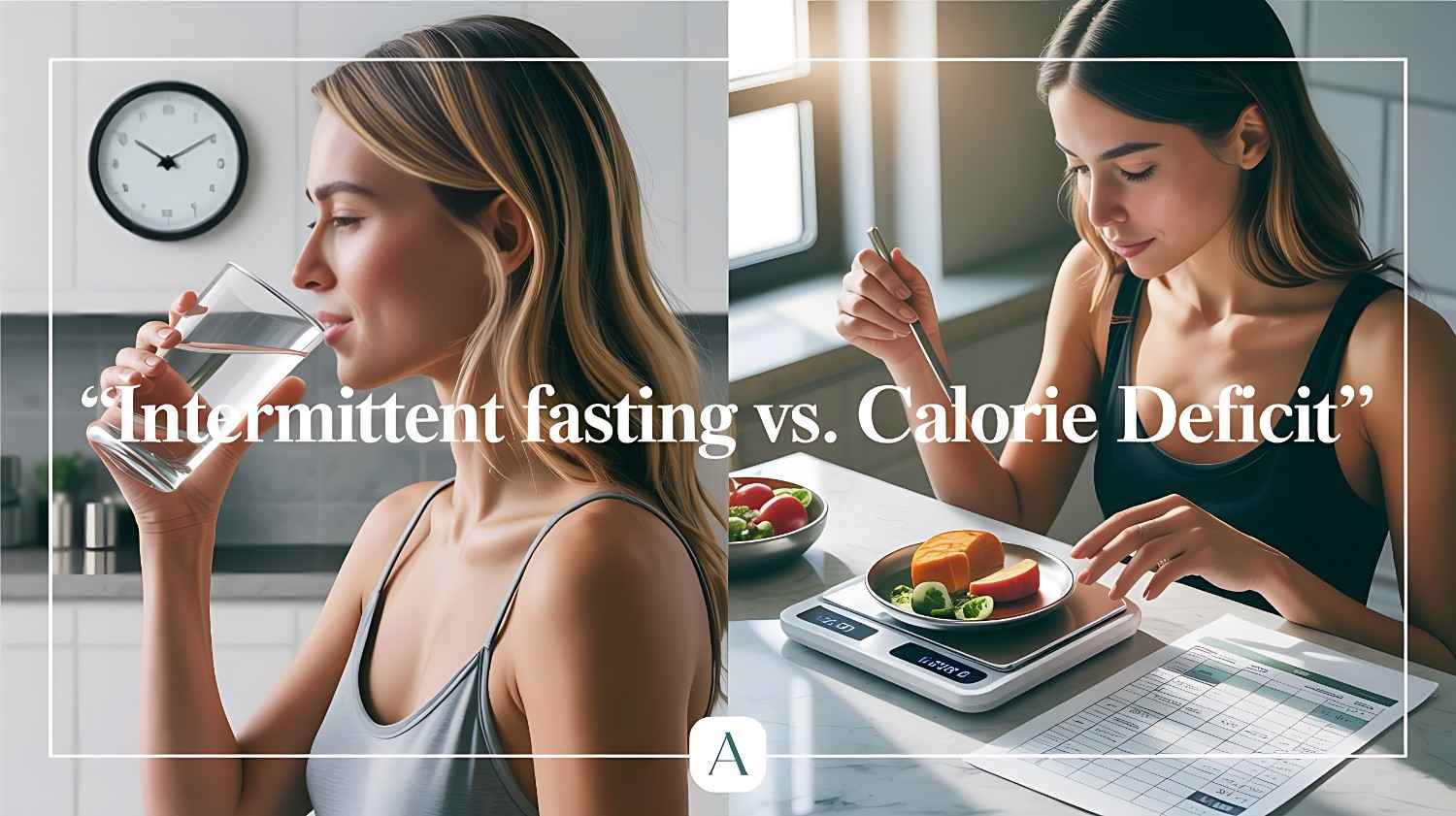Intermittent Fasting vs Calorie Deficit

When it comes to shedding unwanted fat and achieving a leaner, healthier body, one of the most debated topics in the fitness world is: Intermittent Fasting vs Calorie Deficit—Which One Is Better for Fat Loss? Both methods have strong supporters and scientific backing, but which one actually delivers better, sustainable results? In this article, we’ll dive deep into both strategies, uncover the science, compare benefits and drawbacks, and help you decide which path aligns with your goals and lifestyle.
Understanding Calorie Deficit: The Foundation of Fat Loss

Before we explore intermittent fasting, it’s essential to grasp the basic principle of a calorie deficit, because at the end of the day, fat loss only happens when you consume fewer calories than your body needs. A calorie deficit simply means that you’re eating fewer calories than your body burns in a day. When your body detects this shortfall, it turns to stored fat for energy, resulting in gradual fat loss.
For example, if your body burns 2,800 calories daily and you consume 2,300, you’re in a 500-calorie deficit. Over a week, that adds up to a potential loss of around half a kilogram of body fat, assuming everything else remains constant.
The beauty of the calorie deficit approach is its flexibility. You’re not restricted by meal timings or rigid rules. You can eat three, four, or even five times a day—what matters is your total calorie intake. This makes it ideal for individuals who prefer structured meal plans or have specific dietary needs. However, the downside is that it requires a consistent eye on portion sizes, calorie tracking, and can sometimes lead to hunger or cravings if not managed wisely.
What is Intermittent Fasting and How Does It Work?

Now, let’s break down intermittent fasting, which has surged in popularity due to its simplicity and promising results. At its core, intermittent fasting is not a diet but a pattern of eating. It alternates between periods of eating and fasting. One of the most common methods is the 16:8 method, where you fast for 16 hours and eat within an 8-hour window.
But how does intermittent fasting support fat loss? During the fasting period, insulin levels drop, prompting the body to access stored fat as energy. Simultaneously, levels of growth hormone and norepinephrine rise, both of which promote fat breakdown. Moreover, fasting initiates cellular repair processes like autophagy, which can improve metabolic health and longevity.
What makes intermittent fasting appealing is that it naturally limits your calorie intake without strict calorie counting. If you’re eating only two meals within a window, chances are you’re consuming fewer calories than if you were eating five or six meals a day.
Intermittent Fasting vs Calorie Deficit: The Core Differences

So, what separates intermittent fasting from a simple calorie deficit? The biggest distinction lies in structure versus flexibility.
With intermittent fasting, the structure is based on time. You’re given a clear window to eat, and outside of that, you consume nothing but water, black coffee, or herbal tea. This time-restricted framework often helps people avoid mindless snacking and late-night bingeing—two major obstacles to fat loss.
On the other hand, calorie deficit focuses purely on numbers, not timing. You can eat at any time of the day, as long as your calorie intake remains lower than your expenditure.
Interestingly, intermittent fasting can lead to a calorie deficit by default. By shortening your eating window, you may end up eating less—even if you’re not deliberately tracking calories. However, this is not always guaranteed. It’s entirely possible to overeat during your feeding window, thereby negating the benefits.
ullamcorper mattis, pulvinar dapibus leo.
Which is More Effective for Fat Loss? Intermittent fasting or calorie deficit

Let’s address the big question: Intermittent Fasting vs Calorie Deficit – Which One Is Better for Fat Loss? The truth is, both strategies can work, but the best method is the one you can stick to long-term.
Scientific studies have shown that when calorie intake is controlled, intermittent fasting does not necessarily result in greater fat loss compared to a standard calorie deficit. In other words, fat loss boils down to the calorie deficit, regardless of whether it’s achieved through time-restricted eating or portion control.
However, intermittent fasting may provide additional metabolic benefits, such as improved insulin sensitivity, reduced inflammation, and better appetite regulation for some individuals. It may also offer a mental edge—having fewer meals to think about often makes dieting simpler for those with busy schedules.
That said, intermittent fasting isn’t for everyone. People with blood sugar issues, hormonal imbalances, or those prone to binge-eating may find it counterproductive. On the flip side, calorie deficit is more versatile and inclusive, allowing individuals to work around their hunger cues, energy needs, and daily routine.
The Psychological Impact of Intermittent fasting vs calorie deficit: Discipline vs Freedom

Another important angle in the intermittent fasting vs calorie deficit debate is psychological sustainability. Intermittent fasting imposes strict boundaries, which some find incredibly freeing—no need to plan six meals or count every bite. Others may find the extended fasting period stressful, especially in social settings or if they train early in the morning.
Calorie deficit, meanwhile, allows for greater freedom, but it demands discipline in portion control. There’s also the temptation to spread calories too thin, which may lead to feelings of constant hunger if your food choices aren’t nutrient-dense.
So, ask yourself: Do you thrive on structure and time-restricted eating, or do you prefer flexibility with your meals and snacks?
Combining Intermittent Fasting with a Calorie Deficit: Best of Both Worlds?
Here’s where things get interesting: you don’t have to choose one or the other. In fact, many successful fat loss transformations occur when intermittent fasting is combined with a moderate calorie deficit. The fasting window can help limit your total intake, while mindful eating within that window ensures you’re not overshooting your caloric needs.
For example, someone practicing the 16:8 method might eat two nutrient-rich meals and one snack within that window. By focusing on high-protein, fiber-rich foods, they can stay full, build muscle, and still maintain a calorie deficit effortlessly.
This hybrid approach offers the metabolic perks of fasting, the fat-burning power of a calorie deficit, and a practical structure to follow.
Conclusion: Intermittent Fasting vs Calorie Deficit – What Should You Choose?
To wrap it all up, intermittent fasting vs calorie deficit is not a battle where one emerges as the universal winner. Rather, it’s about discovering what fits your life, goals, and habits best.
If you’re someone who enjoys routines, fewer meals, and doesn’t mind skipping breakfast, intermittent fasting might feel effortless. On the other hand, if your lifestyle revolves around flexible eating times or social meals, a traditional calorie deficit will be easier to implement and sustain.
Whichever route you take, always remember: fat loss only occurs in a calorie deficit. Intermittent fasting is just one of the many ways to achieve that.
FAQs: Intermittent Fasting vs Calorie Deficit
Q. Can I lose fat faster with intermittent fasting?
Yes, but only if you still maintain a calorie deficit during your eating window. Fasting alone isn’t magic—calories still count.
Q. Which one preserves more muscle?
Both methods can preserve muscle when combined with resistance training and adequate protein intake. There’s no major difference if done right.
Q. Is it okay to work out while fasting?
Yes, fasted workouts are generally safe, but not ideal for everyone. Monitor your energy levels and hydration closely.
Q. How do I know which is better for me?
Try both approaches for 2–3 weeks and assess your hunger levels, energy, sleep, and mood. Choose the one that feels more sustainable.
If you found this article helpful, share it with someone struggling with fat loss confusion. And if you’re ready to start your personalized fat loss journey, check out our 101 Weight Loss Diet Consultation Program—expert-guided, vegetarian, and customized just for you.
READ OUR NEW BLOG ON OZMEPIC WEIGHT LOSS – CLICK HERE
YOGA DANCE FOR BELLY FAT REDUCTION – CLICK HERE
WEIGHT LOSS PLATEAU – CLICK HERE
Visit our Instagram @kmohitvermaa / @ fitwithmohit.ig
